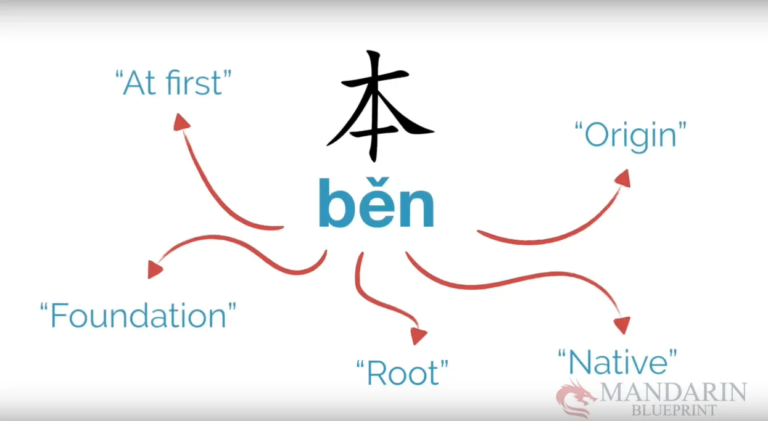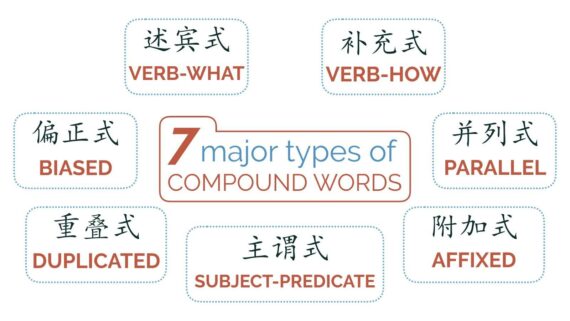Foundation in Chinese- Chinese Character 本 běn

本- běn: Foundation in Chinese (basis, origin, originally, at first, native)
本 (foundation in Chinese) is such a tremendous character. That’s right. Tremendous. Clearly the main component in it is a tree 木, but there is an extra stroke at the bottom, but not so far down as to not visually indicate the existence of a root going beneath the ground. Thus the idea of a foundation or origin is visually apparent in the character itself.
As a result, when used in many words this meaning gets applied sometimes concretely but often metaphorically.
To start, let’s consider two words that are a “Juxtaposed” compound word structure. That is to say, both characters hold equal value and (in this case) have the same or similar meanings:
根本 (gēn)
The character 根 also has a tree in it, and its meaning is the “root” of a plant. Clearly, this is quite a similar meaning to 本 (foundation in Chinese),so classifying this word as “Juxtaposed” makes sense. So what does it mean?
Well, it has a few different functions, but all of them relate to something fundamental. It can be used as a noun, simply to mean the foundation or base of something, usually abstract in nature, like the “root” of a problem.
You can even use this word as an adverb in the negative to indicate that you fundamentally, or at all, oppose whatever you are talking about. If you say “I don’t agree with you” that’s one thing, but if you say “I don’t agree with you at all”, you even don’t agree with the persons fundamental assumptions.
基本 (jī)
基本 is a similar word to 根本, but is often used to refer to something being basic or elementary. 基 by itself means foundation, which can be visually represented in the character by noting that the bottom component is 土, which is soil or earth, the foundation for anything that we build. You might have a 基本 class in university, or add the character for “on” (上) after it to say “Basically…” i.e. “基本上” (jīběnshang…)
本科 (kē)
Playing off the idea of 基本 knowledge, another way of expressing that idea comes through the word 本科. 科 simply means “academic discipline”, so unsurprisingly the basis 本 (foundation/root in Chinese) academic discipline (科) refers to undergraduate study.
资本 (zī) & 成本 (chéng)
These two words both relate to business, the first meaning capital, and the second meaning cost. 资 has one definition that is simply “money”, and so your “money foundation” is your companies capital. 成 has a number of usages, but its basic meaning is “to become” or “turn into”, so you could conceptualize that your company’s costs “become” the “basis” of your operations, seeing as you always have to consider them when calculating profit.
本来 (lái)
You’ll hear this particular adverb quite often, as it means originally. As in, “I originally hated the taste of Huajiao, but now I’ve grown to find it to be the flavor king of all spices”. This makes sense when you consider that the two characters combine to mean “origin” and “come from”. Something that came from the past has changed, so we need to articulate this by using 本来.
本色 (sè) & 本 能 (néng)
Another way to think of “origins” are things that are innate to us, which is another way you can express meaning through 本. 本色 can literally mean a base color (色) in art, but I hear it more often used to express someone’s true colors, or their innate way of being. 本能 is quite similar, because it means “innate ability” or more succinctly, your instincts.
本人 (rén) & 本地 (dì) & 本 身 (shēn)
These last three are all indicating another iteration on the meaning of 本, which is closer to simply meaning this. 本人 is a formal way of saying oneself, literally “this person”. 本地 means “this-land”, and so it is often used to refer to whether or not someone is a local, or a 本地人 (本 foundation/root in Chinese)(人 rén- person) local person.
I alluded to 本身 above when I said in and of itself, which is its meaning. It’s actually quite cool to realize why that is, because 身 means “body”, so the meaning is “this-body”.
This could be the body of a person or an object or even just the “body” of an idea, but regardless of what it is, 本身 lets you know that the thing you are describing in and of itself has some characteristic. The self-referential nature of saying “this-body” illustrates this quite poetically.
本来 I didn’t realize that learning character-by-character was the right way to go, but I continued to study and talk to some 本地人, which helped me realize how characters 本身 are not only worth the study but changed my modes of thinking as well.
If you want to learn more about Chinese Characters, you should read this guide!








